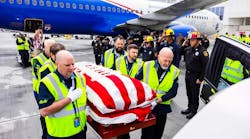You probably recall my previous articles about Cooper and his travails on the way to the Supreme Court. He lost in the District Court and won on appeal to the Ninth Circuit Court of Appeals in San Francisco. The FAA appealed to the Supreme Court … Cooper, however, lost his case in the Supreme Court.
We should all be concerned about the result in this case because it clearly seems to go against the spirit and intent of the Privacy Act of 1974 which protects all citizens from unlawful conduct by the government. In some ways, many would suggest that it is even more important than the coming result in the Obamacare Case, now pending before the court. The Cooper case should be of particular interest to technicians who are also pilots and take medical exams to renew their fitness for flight.
Cooper sued the FAA and the Social Security Administration and others, alleging that they all had violated the Privacy Act of 1974 by unlawfully disclosing his private and confidential medical information, (without his permission) causing him great mental and emotional damages. The Ninth Circuit Court of Appeals decision in his favor was recently reversed by the Supremes.
The Privacy Act
We should keep in mind, that you cannot sue the government for just any alleged unlawful action … the government only allows itself to be sued in very few instances and then only when it says so, as in the Privacy Act and other statutes, such as the Federal Tort Claims Act.
The Privacy Act, 5 USC 552a, allows recovery against the government for actual damages and does not specifically authorize an award of money damages for mental or emotional distress. For intentional or willful violations of the Act, the government is liable for actual damages.
Justice Alito delivered the majority opinion.
The court concluded, after much discussion, that, the Act does not waive the federal government's sovereign immunity from liability for such injuries that are described as mental or emotional.
Justice Sotomayor wrote the dissent concurred in by Justices Ginsburg and Breyer: "Congress enacted the Privacy Act of 1974 for the stated purpose of safeguarding individual privacy against government invasion. To that end, the Act provides a civil remedy (lawsuit) entitling individuals adversely affected by certain agency misconduct to recover “actual” damages sustained as a result of the unlawful action (of the government agencies), ..."
The strong dissent continued …"Today the Court holds that actual damages is limited to pecuniary loss. Consequently, individuals can no longer recover what our precedents and common sense understand to be the primary, and often only, damages sustained as a result of an invasion of privacy, namely mental or emotional distress. That result is at odds with the text, structure, and drafting history of the Act. And it cripples the Act's core purpose of redressing and deterring violations of privacy interest.”
The gist of the Privacy Act is simply a requirement that the government agency get the permission of the party concerned and disclose to him or her what they intend to do … before they disclose anything that might hurt the person. In this case, they failed miserably to comply with this requirement.
Some history, criminal investigation of 45,000 pilots
In 2002 the Department of Transportation (FAA) started a joint criminal investigation called “Operation Safe Pilot” with the Social Security Administration. It was designed to identify medically unfit pilots who had obtained FAA approved medical certificates indicating they were fit to fly. The FAA gave the SSA a list of the names of some 45,000 pilots located in the general Bay Area of San Francisco and northern California. SSA compared the list with its records to see if any of the pilots were receiving SSI benefits for any disabilities. SSA’s records turned up the name of Cooper … among others, and it revealed that he had a current FAA medical certificate but had also received disability benefits for HIV and other relevant medical infirmities. FAA medical examiners revealed that they would not have issued the medical certificates (there were five in all) had they known his true condition.
Cooper’s private pilot license was revoked. He was also indicted by the U.S. Attorney in San Francisco on three counts of making false statements on his medical applications to a Government Agency (FAA) in violation of 18 USC 1001. He pleaded guilty and was sentenced to two years probation and fined $1,000. In his lawsuit under the Privacy Act he alleged that by sharing his personal medical information, without his permission or knowledge, he was “humiliated and embarrassed, suffering mental anguish, fear of social ostracism, and other severe emotional distress.” He did not list any money damages like loss of wages or other pecuniary damage. This was a fatal flaw to his claim! If he had been an airline pilot and also had loss of wages then he might have prevailed.
The Court of Appeals on the other hand found that the word “damages” did include the mental distress and other emotional damages and therefore found in his favor but of course the Supremes reversed it.
Court reasoning
The Supreme Court admitted in its decision that the term “actual damages” does change depending on the specific statute in which it is found. The term does sometimes include such damages as Cooper alleges … nonpecuniary damages. However, in his case the court said that it is clear that the intent was to provide only for pecuniary damages, i.e. money damages, generally referred to as “special damages.” Sadly for Cooper he alleged none.
This decision illustrates the point that to use this statute you must point to some specific thing such as loss of a job or something that is an actual out of pocket money damage incurred as a result of the unlawful disclosure of the government. Cooper's lawyer maybe could have done this in his complaint. Surely there was some out of pocket expense that could have been tied to this unlawful disclosure?
Mechanic/pilot warning
Mechanics who also hold pilot certificates should keep in mind that there are ways now with the click of a computer mouse to check on your statements on your medical applications. There is almost total automatic sharing of medical information due to the waivers that you sign on these applications and the authorized medical people can find your complete medical history with little difficulty.
You must put down everything on your application … any history that you have not reported, medications not reported, etc., etc. They can easily cross check and find that you have not reported a previous history that is in some other medical record in the medical care system. Even outside of government records, many medical insurance and hospital plans now provide for computerized sharing of your medical information freely between each other and the government, simply because somewhere on a form you have given your permission for them to do so.
Be forwarned … the FAA can easily track your medical problems and if found not reported will consider filing criminal falsification charges under 18 USC 1001. In addition, of course, it will revoke all of your FAA airman certificates, including your A&P. Cooper was put through the federal grinder for what was thought to be a minor failure to report issue on his form. He stated for example that he did not think he had to report HIV because it was a particularly private matter and did not have to be reported … he was wrong of course. Don’t bother asking your AME if you should report it … his opinion is not controlling and will not help as an excuse … just report it.
On the other hand, the conduct of these agencies, their employees, and agents, in this case, was particularly egregious and should have been discussed by the court … it was not, of course. Perhaps some sort of punitive award could have been given. The record in the District Court and the Ninth Circuit Court of Appeals sets out in detail how poorly he was treated by the government agents concerned. Of course, they still all have their jobs … none of the government agents were sanctioned for their actions.
Stephen P. Prentice is an attorney whose practice involves FAA-NTSB issues. He has an Airframe and Powerplant certificate and is an ATP rated pilot. He is a USAF veteran. Send comments to [email protected].


